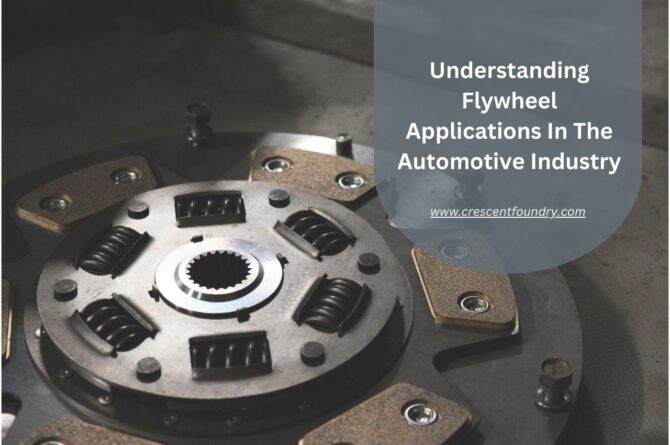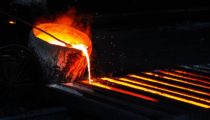The value of the worldwide forklift market stood at around…

Understanding the Application of Flywheels in the Automotive Industry
A flywheel is a heavy wheel that stores kinetic energy and helps engines run smoothly at a constant speed throughout their cycle. Application of Flywheel in the automotive industry are expanding rapidly. They are used in high-end electrical utilities that need reliable energy reservoirs, hybrid electrical automotive solutions, and other industries where considerable power needs to be generated. Different types of flywheels are designed to store and release energy when needed, making them invaluable for applications like wind turbines, photovoltaics, and other renewable energy systems. The top flywheel manufacturers are constantly innovating and pushing boundaries to stay ahead of the competition.
In terms of value, the global automotive flywheel market is expected to grow at a CAGR of more than 5% over the next five years. The global market is divided into two types of flywheels: single-mass flywheels and dual-mass flywheels. The single mass flywheel category is expected to hold the largest market share throughout the projected period. This market’s growth might be attributed to increased demand for lightweight and fuel-efficient cars.
Crescent Foundry is a top flywheel manufacturer and exporter of ductile manhole covers, counterweights, and customised moulding and fabricated products. It is also one of the leading flywheel suppliers In India.
There are several things to consider while deciding which flywheel is ideal for your company. High-quality materials, including ductile iron, nodular iron, chromoly alloy, billet aluminium and billet steel, are used to create the flywheel. To eliminate the need for frequent repairs and maintenance, it should be corrosion-resistant. Flywheels are renowned for their ability to store energy and directly affect drivability, performance, and safety.
Crescent Foundry is a pioneer in developing superior-class 6–8 vehicle flywheels. They are the only ones perfecting single- and dual-mass vehicle flywheels. For the first time in India, Crescent Foundry has a high-pressure moulding process called Sinto Flex that can produce 25000 metric tonnes of flywheels annually. We supply heavy-cast single-mass and dual-mass flywheels that allow direct contact between the clutch assembly and the engine – and are formed of a single piece of steel or metal. The flywheels from Crescent Foundry are designed to provide simple drainage and smooth maintenance, eliminating the need for levitation bearings and extra concrete installation areas.
What are the benefits of using flywheels in the automotive industry?
In the automotive sector, flywheels have several advantages. One of their main advantages is storing energy and providing the engine with a steady and continuous power source. They are an affordable option for energy storage since they may endure for years or even decades.
Flywheels may enable quicker acceleration and deceleration since they have a reduced moment of inertia. This may make the car more responsive and enhance the overall driving experience.
Flywheels are additionally secure, dependable, and energy-efficient. They may be used in various contexts since they are also temperature independent.
Overall, flywheels are a crucial part of the automobile industry, and there are several advantages to using them. They boost the vehicle’s overall performance, feed the engine with a steady and smooth stream of power, and are solid and long-lasting.
Keep Reading: Types Of Flywheels And Their Usage
What are the limitations of flywheels in the automotive industry?
There are various drawbacks to flywheels in the automobile sector. One of their main drawbacks is that they may occupy a lot of room. Space-constrained vehicles, such as compact automobiles or electric cars, may have difficulty with these components. The fact that flywheels may be costly to make is another drawback. As a result, they may not be as cost-effective as alternative energy storage options like batteries. Compared to batteries, flywheels have a smaller energy storage capability. As a result, they may not be appropriate for applications requiring a significant level of energy storage.
Flywheels may also be hefty, adding to the car’s overall weight. Performance in general and fuel economy may suffer as a result.
While flywheels offer several advantages in the automobile sector, they also have drawbacks. These drawbacks include weight, price, little energy storage, and size. That’s precisely why it is crucial to source flywheels from a reliable supplier, to get assured performance and best value for money.
What are the different materials used to make flywheels in the automotive industry?
Depending on their intended usage, the flywheels used in the automobile industry are built of various materials. Toys for kids often use little lead flywheels, whereas vintage steam engines utilise flywheels made of cast iron. Cast or nodular iron, steel, or aluminium are typically used to construct flywheels for automobile engines. Additionally, suggested car energy storage and braking systems materials are high-strength steel or composites. The use and desired features, such as weight, durability, and energy storage capacity, determine the flywheel’s material choice. The most significant amount of energy a flywheel can store per unit weight determines its efficiency, and as the rotating speed or angular velocity rises, so do the strains placed on the flywheel.
As the automotive industry continues to evolve, we will likely see more applications of flywheel technology and more flywheel suppliers In India in the future.





